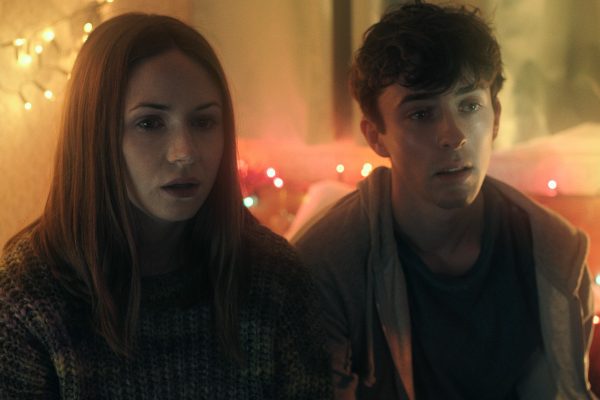Karen Gillan’s debut feature has been on the festival merry-go-round for some time. Wee Review fav Rachel Jackson chatted to us about her role last Summer. In the meantime, Gillan’s Hollywood star has continued to ascend, with roles in Jumanji and the Avengers behemoth. The Party’s Just Beginning‘s eventual arrival on general release establishes Gillan as a multi-hyphenate talent who can hew a fresh furrow into a familiar scenario.
Liusaidh (Gillan) is a young woman in permanent self-destruct mode after witnessing the violent suicide of her best friend Alistair (Matthew Beard) a year previously. As the anniversary of his death approaches she dwells on the events leading up to the event, in between nightly self-annihilating bouts of binge drinking and casual sex.
While The Party’s Just Beginning doesn’t reinvent the wheel in terms of its depiction of grief, Gillan’s deftness with its choppy chronology teases more from her character than the smothering, narcissistic emotional pain that’s evident on the surface. Apart from some artful transitions between time periods, they reveal Liusaidh to have been a deeply troubled soul already, and Alistair’s subsequent death an anchor for her existing depression; one that will haul her down should she give in to it completely.
Perhaps the strongest aspect of the film is in the establishment of atmosphere, and Gillan’s skill in exploring a universal human experience through very personal specificity. Alistair’s suicide from a railway bridge is not only a personal loss but one that fundamentally changes Liusaidh’s relationship to her home town. This sense of place is a focal point of the film but will be recognisable to anyone. Practically every town will have had a tragedy of some description that altars the significance of a hitherto quotidian landmark. For Liusaidh, the railway bridge has become oppressive and haunted by memory, and this traumatic new significance is a further cause of her emotional dislocation.
Less successful is the decision to depict Alistair as a pre-op transexual. His disintegrating relationship with his straight-acting, Christian boyfriend and his status as the other would be motivation enough for his actions. Beyond a few scenes in which he wears makeup and a dress, there’s little to indicate his transsexuality (no discussion of pronouns for example) and it’s arguable that its inclusion somewhat cheapens the issue, although its tangential addition is far less egregious than some films that tackle it head-on, such as the execrable Danish Girl and the tone-deaf Girl. Liusaidh’s fraught home life is also underrepresented given a scene she has with her father (the great Paul Higgins) is presented as pivotal. Too little has been made of their relationship for it to land with the import it should.
The Party’s Just Beginning is flawed, but most of the issues relate to the writing with some narrative contrivance occasionally creeping in. Gillan as a director, however, seems to have arrived fully-formed, with an instinctive sense of when to include some fine impressionistic touches and when to play it straight. By showing restraint she avoids the film becoming overly tricksy which would lessen its emotional impact. She also resists easy catharsis, settling on a sense of vague optimism that feels right. It’s a startling debut and one that puts Gillan in a canon of British actors that have channelled their mainstream clout into the creation of their own uncompromising visions, such as Gary Oldman‘s Nil By Mouth and Tim Roth‘s The War Zone.
At cinemas Sun 1 Dec and available to stream Wed 11 Dec 2019
